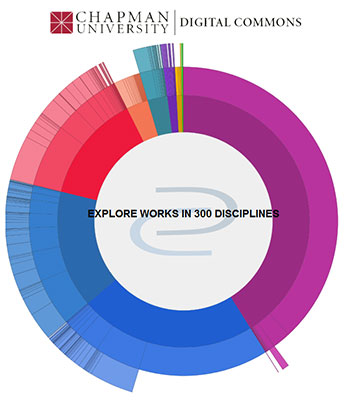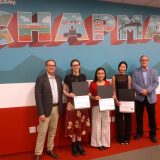
Open Access Week and the Digital Commons
October 23, 2014
 October 20th marked the start of the eighth annual Open Access Week, a time when librarians and academics come together to promote and celebrate the idea of free access to information. It’s a chance to learn about Open Access’ potential to facilitate research across the globe, increase exposure to scholarship, and influence scholars’ ability to use and reuse the results of research. And of course, here at Chapman University, it is a great time to discover and contribute to our new online repository, Chapman University Digital Commons!
October 20th marked the start of the eighth annual Open Access Week, a time when librarians and academics come together to promote and celebrate the idea of free access to information. It’s a chance to learn about Open Access’ potential to facilitate research across the globe, increase exposure to scholarship, and influence scholars’ ability to use and reuse the results of research. And of course, here at Chapman University, it is a great time to discover and contribute to our new online repository, Chapman University Digital Commons!
Launched just two months ago, Chapman University Digital Commons is a space for all of the scholarly and creative work of the Chapman community to come together in one easy-to-use site. It allows us to share and advertise our work on a global scale, helping to facilitate access to research that normally lives behind paywalls and increasing our status among the international research community.
And it’s useful for researchers, too. Besides the fact that making work open access has been shown to increase its impact, Chapman University Digital Commons allows our researchers to comply with increasing open access and data management mandates, by providing a stable online space for data, articles, book chapters, images, presentations, learning materials, and much more.
It even hosts this helpful video to help you learn more about open access.
There are a number of other great tools to help you learn more about open access:
- The Open Access Button is a browser bookmarklet that you can use to show the global effects of research paywalls and to help get access to the research you need. Every time you hit a paywall blocking your research, click the button. Fill out a short form, add your experience to the map, and then search for access to papers.
- SHERPA/RoMEO is a searchable database of publisher policies regarding copyright and self-archiving of journal articles. Each entry details which versions of an article may be archived and any embargo periods or other conditions.
- The Scholar’s Copyright Addendum Engine and the SPARC Author Addendum are handy tools to help authors generate license addenda that allow for reproduction, distribution, and reuse of their work.
- The Open Access Textbooks’ repository, College Open Textbooks, Global Text Project, and SUNY Open Textbooks are helpful resources for faculty interested in using free or low-cost textbooks for their course instruction to combat the rising prices charged by traditional textbook publishers.
Want to include your work in Chapman University Digital Commons or learn more about open access? Contact Kristin Laughtin-Dunker, Coordinator of Scholarly Communications and Electronic Resources, at laughtin@chapman.edu. You can also check out the Scholarly Communications research guide.

